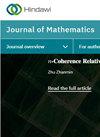The Best Fit Bayesian Hierarchical Generalized Linear Model Selection Using Information Complexity Criteria in the MCMC Approach
IF 1.3
4区 数学
Q1 MATHEMATICS
引用次数: 0
Abstract
Both frequentist and Bayesian statistics schools have improved statistical tools and model choices for the collected data or measurements. Model selection approaches have advanced due to the difficulty of comparing complicated hierarchical models in which linear predictors vary by grouping variables, and the number of model parameters is not distinct. Many regression model selection criteria are considered, including the maximum likelihood (ML) point estimation of the parameter and the logarithm of the likelihood of the dataset. This paper demonstrates the information complexity (ICOMP), Bayesian deviance information, or the widely applicable information criterion (WAIC) of the BRMS to hierarchical linear models fitted with repeated measures with a simulation and two real data examples. The Fisher information matrix for the Bayesian hierarchical model considering fixed and random parameters under maximizing a posterior estimation is derived. Using Gibbs sampling and Hybrid Hamiltonian Monte Carlo approaches, six different models were fitted for three distinct application datasets. The best-fitted candidate models were identified under each application dataset with the two MCMC approaches. In this case, the Bayesian hierarchical (mixed effect) linear model with random intercepts and random slopes estimated using the Hamiltonian Monte Carlo method best fits the two application datasets. Information complexity (ICOMP) is a better indicator of the best-fitted models than DIC and WAIC. In addition, the information complexity criterion showed that hierarchical models with gradient-based Hamiltonian Monte Carlo estimation are the best fit and have supper convergence relative to the gradient-free Gibbs sampling methods.在 MCMC 方法中使用信息复杂性标准选择最合适的贝叶斯层次通用线性模型
频数统计学派和贝叶斯统计学派都改进了统计工具和收集数据或测量结果的模型选择。由于难以比较复杂的分层模型,其中线性预测因子因变量分组而异,而且模型参数的数量也不尽相同,因此模型选择方法得到了发展。人们考虑了许多回归模型选择标准,包括参数的最大似然(ML)点估计和数据集的似然对数。本文通过一个模拟和两个真实数据实例,展示了贝叶斯信息矩阵的信息复杂度(ICOMP)、贝叶斯偏差信息或广泛适用的信息准则(WAIC)对重复测量拟合分层线性模型的影响。在最大化后验估计的情况下,考虑到固定参数和随机参数,推导出贝叶斯层次模型的费雪信息矩阵。利用吉布斯抽样和混合汉密尔顿蒙特卡洛方法,对三个不同的应用数据集拟合了六个不同的模型。通过这两种 MCMC 方法,确定了每个应用数据集下拟合最佳的候选模型。在这种情况下,使用汉密尔顿蒙特卡洛方法估计的具有随机截距和随机斜率的贝叶斯分层(混合效应)线性模型最适合两个应用数据集。信息复杂度(ICOMP)是比 DIC 和 WAIC 更好的拟合模型指标。此外,信息复杂度标准显示,与无梯度吉布斯抽样方法相比,基于梯度的哈密尔顿蒙特卡洛估计的分层模型拟合效果最好,收敛性更强。
本文章由计算机程序翻译,如有差异,请以英文原文为准。
求助全文
约1分钟内获得全文
求助全文
来源期刊

Journal of Mathematics
Mathematics-General Mathematics
CiteScore
2.50
自引率
14.30%
发文量
0
期刊介绍:
Journal of Mathematics is a broad scope journal that publishes original research articles as well as review articles on all aspects of both pure and applied mathematics. As well as original research, Journal of Mathematics also publishes focused review articles that assess the state of the art, and identify upcoming challenges and promising solutions for the community.
 求助内容:
求助内容: 应助结果提醒方式:
应助结果提醒方式:


